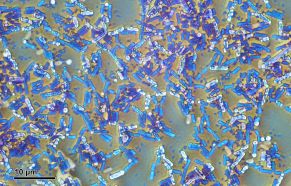All Stories
-
 Physics
PhysicsTiny silica spheres put the disco in disco clams
The electric effect in disco clams is actually the result of light scattering off tiny silica spheres.
-
 Science & Society
Science & SocietyWeapon inspection scheme would test for nukes but keep designs secret
Technique borrowed from computer science could improve weapon verification and encourage countries to agree to nuclear disarmament.
By Andrew Grant -
 Health & Medicine
Health & MedicineYour baby can watch movies for science
Any parent with a computer can let their kid participate in child development studies through a new website called Lookit.
-
 Animals
AnimalsLionfish dance can recruit partner for hunting
Slow but superb predators recruit pals for cooperative hunting, often striking in what looks like well-mannered turn taking.
By Susan Milius -
 Life
LifeLife began when algorithms took control
Digital storage of molecular information is the key to defining life and understanding its origin, astrobiologists say.
-
 Microbes
MicrobesThe most personal data on your phone is your microbiome
Phones carry more than your contacts and messages. They’ve got your microbiome too.
-
 Animals
AnimalsTiny frogs host an illusion on their backs
How dyeing dart frogs move changes how predators see the amphibians, a new study finds.
-
 Astronomy
AstronomyMilky Way galaxy’s dust clouds shown in 3-D map
A new three-dimensional map of interstellar dust in the Milky Way wraps 180 degrees around the sky and extends over 16,000 light-years from Earth.
-
 Neuroscience
NeuroscienceThe simplest form of learning is really quite complex
Habituation, the ability to ignore irrelevant stimuli, is the simplest form of learning but may require a whole neural network.
-
 Life
LifeBacteria’s tail spins make water droplets swirl
When bacteria band together, they can turn a fairly tame drop of water into a swirling vortex.
-
 Earth
EarthWavy jet stream linked with extreme weather
Extreme weather events have been linked with big waves in the jet stream.
-
 Particle Physics
Particle PhysicsIt’s almost time to get to know the Higgs boson better
The next run of particle collisions at the Large Hadron collider will examine details about how the Higgs boson interacts with other particles to search for clues to new physics.